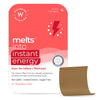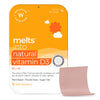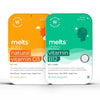Got too much to do but very little energy for the same? How often do you feel caught up in situations where you are required to complete a list of tasks but you feel either exhausted, overburdened, or simply too tired to get through your "To Do List"? Today’s fast-paced lifestyle demands that you be on your toes, and your regular diet might not provide sufficient energy to help you power through. So what are you supposed to do? Well, the secret to getting that instant energy boost is not endless cups of coffee but rather picking the right ingredients that have a certain amount of nutrients that can help you get through the day effortlessly. Keep reading to learn more about these powerful nutrients and the best way to reap all their benefits.
5 Nutrients that will Give You an Instant Energy Boost
1. Naturally Derived Caffeine
We all rush to grab a cup of coffee when we feel drowsy or want to feel refreshed. But did you know that caffeine from green tea gives you the same kick as regular coffee but without the jitters or caffeine crash? Basically, it's the caffeine, not the coffee, that gives you the energy boost. But as we all know, anything in excess can cause damage, so moderation is the key.
Going for options that have less caffeine content than regular coffee can give you similar health benefits. For example, a cup of coffee with 95 mg of caffeine gives you a much-needed instant energy boost, while a cup of green tea with less (28 mg) caffeine gives you similar results. This means green tea gives you three times less caffeine in a single cup than coffee, but the same kick that coffee provides.
Since we are all aware of the health hazards of excess caffeine, opting for green tea caffeine would be a smarter choice.
Apart from its lower caffeine content, green tea also offers benefits like a calming and soothing experience due to its L-theanine component. This slows the absorption of caffeine by the brain, thus reducing the jitters. It is also rich in anti-aging and anticancer properties owing to its antioxidant component.
How to Include Green Tea Caffeine in your Routine?
You can start your day with a cup of green tea and add energy supplements mid-day or before a workout for that sustained source of energy.
2. Vitamin E
This fat-soluble vitamin has a range of benefits, some of which include supporting your immune system, promoting eye, hair, and skin health, and even preventing the risk of heart disease. Its antioxidant properties prevent oxidative stress (cell damage due to free radicals). For this same reason, Vitamin E prevents muscle damage caused by exercise, thus protecting the muscle mass and retaining the body’s energy levels. Primarily, during exercise, a regular pattern of muscle breakdown and repair takes place. If this repair is disrupted or not initiated, the muscle cell may die. All the cells, including muscle cells, have membranes that can get torn, and if they are not repaired on time, cell death occurs. Vitamin E plays a vital role in nourishing and maintaining all kinds of cell membranes, thereby promoting muscle cell repair and rebuilding. Generalized fatigue could be directly proportional to low lean muscle mass. This would mean, more muscle mass is equal to higher energy levels and less weakness. Thus, by increasing our muscle mass, we increase our capacity for glycogen (fuel or energy) storage.
How to Include Vitamin E in your Routine?
Cooking your meals in either sunflower oil, almond oil, or safflower oil can help boost vitamin E levels in the body. Instead of munching on chips in-between meals, replace them with nuts and seeds like almonds, hazelnuts, peanuts, etc. to curb your appetite the healthy way.
3. Vitamin B5
This is a water-soluble vitamin, also known as pantothenic acid. Just like vitamin E, this nutrient is also essential for healthy hair, skin, nails, and a healthy heart. It helps put your macronutrients (carbohydrates, proteins, and fats) to use by converting them into a form that the body can use for energy. Providing a constant supply of sustained energy helps beat chronic fatigue. For more energy, a sufficient amount of this vitamin needs to be provided for metabolizing the carbohydrates that release energy (glucose). Also, deficiency of this particular vitamin has been linked to the generalized malaise. It plays a crucial role in digestion and nutrient absorption, thereby promoting healthy digestion.
People with digestive disorders may have a deficiency in this vitamin, so supplementation would be needed. It is also crucial for nervous system support and helps prevent chronic fatigue. If you have been facing long-term fatigue or indigestion for no obvious reason, there is a strong possibility that your diet lacks this vitamin.
How to Include Vitamin B5 in your Routine?
Starting your day with eggs and adding foods like broccoli, mushrooms, and fish to your lunch can help boost vitamin B5 levels and, in turn, keep you energized the entire day.
4. Vitamin B6
Pyridoxine, commonly known as vitamin B6, is another nutrient that is extremely essential for your brain health and immune system. Pyridoxine is needed for the utilization of energy from the foods you consume. It also aids in the production of melatonin (the sleep hormone) and serotonin (mood regulation) as well. Along with optimal energy, you must ensure the availability of these hormones in order to make the most of your day. The availability of this vitamin will make sure that you remain in the right mood and alert/awake by ensuring sufficient production of these two hormones.
Deficiency of this vitamin can result from malabsorption disorders like Crohn’s disease, ulcerative colitis, celiac disease, etc. You may require external supplementation to improve the metabolism of the nutrients you consume through food. Pyridoxine supplementation may also be beneficial for people suffering from sleep disorders such as insomnia or for frequent travelers experiencing jet lag.
How to Include Vitamin B6 in your Routine?
Consume meat, fish, poultry, and potatoes for your main meals to increase vitamin B6 levels in the body. When you are craving some snacks, munch on nuts like pistachio, sesame seeds, lotus seeds, hazelnut, hemp seeds, and walnut, or consume fruits like bananas and papayas.
5. Vitamin B12
This water-soluble vitamin, also known as cobalamin, is essential for red blood cell formation, nerve function, cell metabolism, and the production of DNA (materials that carry genetic information within cells). Make sure to have this vitamin, as it will help you keep your brain sharp and alert. Vitamin B12 has long been promoted as an energy enhancer owing to its role in energy metabolism. Vitamin B12 deficiency is very common among people following a plant-based diet or having malabsorption disorders, as this vitamin is found in only animal products. Lack of this vitamin can lead to fatigue, muscle weakness, nerve damage, and gastric troubles.
Hence, supplementation is essential in such cases. Certain food products found on grocery shelves are also fortified with this vitamin.
How to Include Vitamin B12 in your Routine?
For non-vegetarians, adding meat, fish, poultry, and dairy products to your daily diet can help boost your vitamin B12 levels. Vegetarians, on the other hand, can consume fruits like apples, bananas, and blueberries.
Why Should You Invest in Supplements?
Well, now that you know the importance of these nutrients in giving you an instant boost, make sure you are including all of them in your daily diet for the best results. But let’s face it, adding all these ingredients to your diet is a tedious task, and even if you do, it’s not enough to bridge the nutritional gap. Here’s where energy-boosting supplements come to the rescue. While the market is flooded with various energy-boosting supplements, the best way to pick one is by looking for all-natural ingredients. Nutraceuticals now even use nanotechnology to transform nutrients into extremely small particles that instantly dissolve in your mouth and get absorbed into the bloodstream. Energy strips are one of these examples. It provides all of the advantages of coffee without the jitters or caffeine crash.
Along with a change in diet and the addition of dietary supplements, you can maintain that energy boost and stay alert through a long, hectic day by also making a few lifestyle changes.
- Sound Sleep: Even if you recharge yourself with energy boosters on a regular basis, without enough rest, you are bound to feel tired. Our sleep cycle is divided into two main stages: REM (rapid eye movement) and NON-REM (non-rapid eye movement), which are further divided into other stages. Scientists believe that the last stage of NREM (your deep sleep stage) is the phase where your body begins to recharge and repair. Our body’s energy molecule (adenosine triphosphate) is enhanced during the deep sleep stage. This inflow of ATP is responsible for restoring your energy levels. So make sure to get enough sleep at night for an upcoming refreshing day.
- Adequate Hydration: Just like a good night’s sleep, adequate hydration is another important factor for having optimum energy levels for functioning. Water constitutes about 75% of our body weight. The body loses this water through sweat, urine, feces, etc. Replenishing our bodily fluids is critical for cellular health. Even mild levels of dehydration can lead to headaches, fatigue, a lack of focus, and a reduction in performance in sports. So, remember to stay hydrated to feel refreshed.
- Exercise/Physical Activity: In order to have more energy, you need to first spend a little of it. It's true! By being physically active or exercising, we are able to generate more oxygen supply to each cell due to increased oxygen circulation. Plus, exercising helps you release certain hormones like cortisol, aldosterone, testosterone, epinephrine, etc. that in turn help us boost energy production. This surge of energy from hormones helps you feel energized.
Wrapping Up!
Whether you need a pre-workout stimulus or a post-activity recharge, want to beat post-travel fatigue, or simply need sustained energy release all day long, ensure to include the above nutrients in your diet regularly. Give yourself an instant energy boost the right way with a healthy diet and energy boosting supplements.
References :
Eating to boost energy - Harvard Health
The Safety of Ingested Caffeine: A Comprehensive Review - PMC (nih.gov)
Caffeine | The Nutrition Source | Harvard T.H. Chan School of Public Health
Tocotrienol: the natural vitamin E to defend the nervous system? - PubMed (nih.gov)
Vitamin E trafficking in neurologic health and disease - PubMed (nih.gov)
Pantothenic Acid - Health Professional Fact Sheet (nih.gov)
Vitamin E and skeletal muscle - PubMed (nih.gov)
The Antioxidant Requirement for Plasma Membrane Repair in Skeletal Muscle | Request PDF (researchgate.net)
VITAMIN E IN THE TREATMENT OF MUSCULAR DYSTROPHIES AND NERVOUS DISEASES - ScienceDirect
Pyridoxine: MedlinePlus Drug Information
Vitamin B12 - Health Professional Fact Sheet (nih.gov)
Nanotechnologies: 1. What is nanotechnology? (europa.eu)
Nanotechnology | National Geographic Society






























 DOWNLOAD NOW
DOWNLOAD NOW
